A BGA Policy analysis of actuals and encumbrances data from Chicago’s three most recent budget years (2022-2024) found that most city departments stayed well within their annual non-grant budgets.
The Chicago Police Department, by hundreds of millions of dollars, did not.
Based on data obtained from the Department of Finance via Freedom of Information Act requests, BGA found that CPD was the only city department to spend more than its non-grant budget in all three of the most recent complete fiscal years. Police overspend increased substantially each year, leaping from $20.8 million over budget in 2022 to $188.1 million in 2024.
In 2024, CPD’s non-grant overspend alone exceeded the total non-grant departmental budget for 32 of the city’s 39 departments.
The Chicago Fire Department and Chicago Commission on Human Relations also went over budget in 2024, although by considerably less, both as a total sum and a percentage of their departmental budgets.
Budgets vs. Actuals
Despite being in many ways a truer year-over-year point of comparison than prior years’ budgets, actual spend remains a relatively under-discussed part of Chicago’s financial landscape.
Unlike the other largest U.S. cities, Chicago does not include prior year actuals in the annual budgets presented to the city council. New York City, Los Angeles, Houston and Phoenix include actuals (and in some cases current-year estimates as well) in their budget documents, both at the summary and departmental levels.
To add context to the upcoming budget hearings, BGA Policy examined detailed actuals and encumbrances — money spent or obligated each year — from 2022 to 2024. Before 2022, the city did not retain detailed digital actuals, according to the Department of Finance. (Yearly summaries dating back to 2003 can be found in PDF form in the city’s Annual Comprehensive Fiscal Reports.)
The actual and encumbrances datasets for 2022-2024 provided by DoF in response to FOIA requests correspond to local fund data contained in the annual appropriations documents and datasets provided by the Office of Budget and Management, and do not include grant or Community Development Block Grant spending.
The DoF actuals are not quite as granular as OBM’s budget, and lump actuals and encumbrances into categories of appropriations in some places rather than using the same individual appropriation accounts that the budget contains. Using 2024 as the most recent example year, DoF’s data included roughly 130 unique appropriation codes, compared to about 250 in the budget prepared by OBM.
The discrepancies between the two datasets obscure some specifics of the city’s spending patterns—it is possible, for example, to determine from the data how much police overspend came from personnel services in general, but not what portion of that spend stemmed from overtime versus regular salaries.
City council members will have an opportunity to drill deeper at the annual budget hearings, when department heads testify before the council and field questions.
Police Spending a Dramatic Outlier
Non-grant city spending has mostly stayed well under budget in recent years. From 2022-2024, the city as a whole expended or encumbered on average 86.4% of its budgeted local funds. Actual expenditures make up the vast majority of that total; across all three budget years, encumbrances accounted for less than 1% of the total compared against budget.
On average, non-police departments spent 83.3% of their budgeted local funds annually from 2022-2024. Non-departmental spending on citywide appropriations, called “finance general” appropriations in the city’s budget terminology, averaged 80.4% of budgeted spend.
CPD was a dramatic outlier to the typical spending patterns of departmental local funds in recent years, both in total amount and percentage. CPD spent on average 106.4% of its non-grant budget from 2022-2024, with substantial increases each year, reaching 110.4% of budgeted non-grant funds in 2024.
In 2024, the Chicago Commission on Human Relations and Chicago Fire Department also exceeded their budgets, though by substantially less than CPD overspend, both in total dollar amounts and percentage of each department’s budgeted funds:
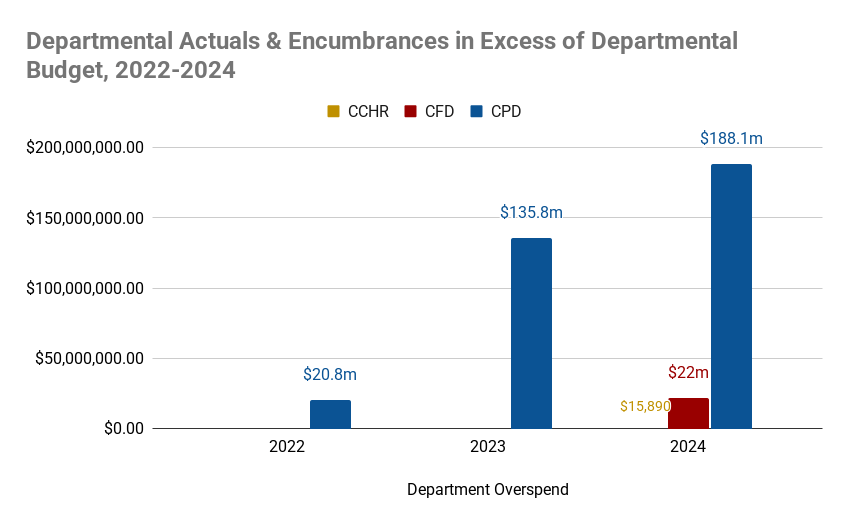
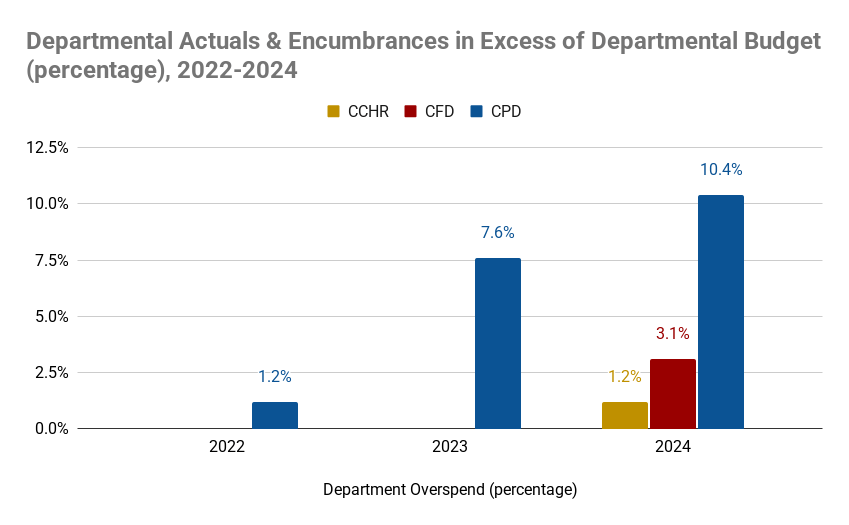
Most other city departments came in substantially under budget each year, ranging in the most recent year from the Office of Inspector General (which spent more than 99% of budgeted funds) to the Department of Planning and Development (whose actuals and encumbrances totalled only 15% of the department’s appropriations).
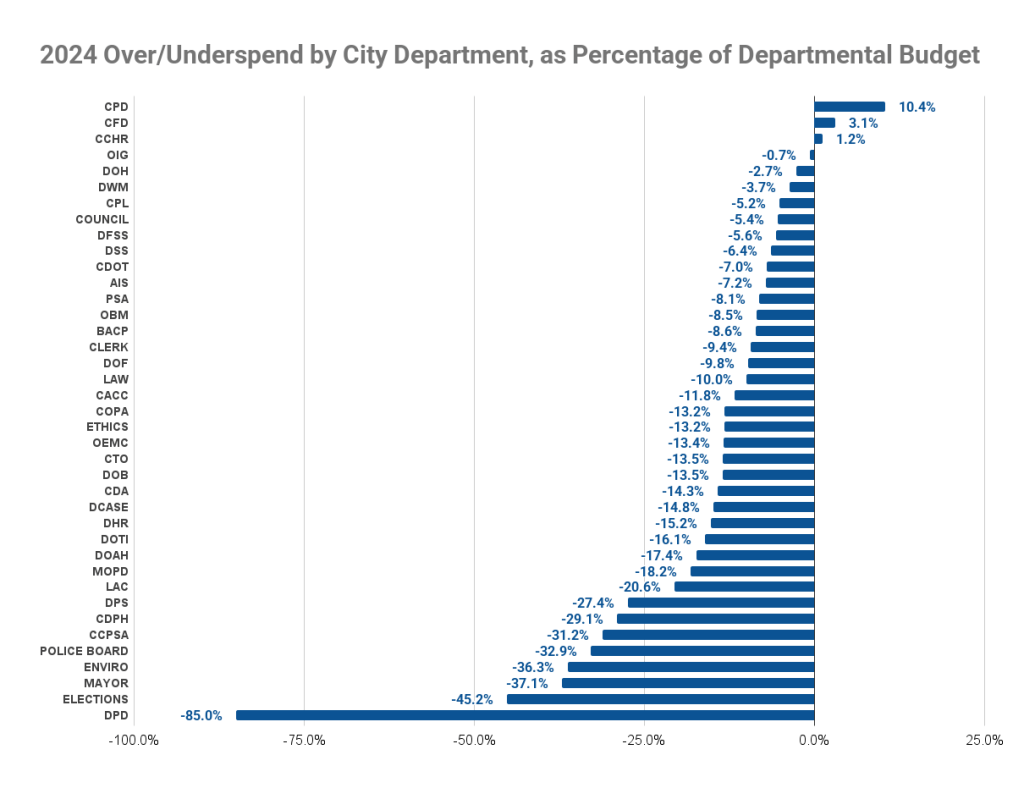
Personnel Costs & Lawsuits Drive Overspending
The vast majority of CPD’s expenses are personnel-related. Roughly 90% of the department’s annual actual spend goes towards personnel services, a broad appropriation category that includes base salaries and various contractual enhancements such as overtime, duty availability and compensatory time, as well as uniform allowances, tuition reimbursement and other benefits. (Department of Finance data refers to the category as “Personal Services,” while OBM’s budgets use the phrase “Personnel Services,” but the appropriation numbering and amounts are consistent between datasets.)
As budgeted funds, regular salaries and wages made up roughly 80% of CPD’s personnel expenses budget in 2024, with a further 6% going to overtime, 3% to salary provision and the remainder of the personnel expense appropriation accounts 1% or less of the category. The DoF datasets provided in response to FOIA requests do not break out personnel services data by individual appropriation categories.
The personnel services category generated the most CPD overspend in 2023 and 2024. Court settlements and judgements made up the other major spend category that exceeded budget, with relatively smaller levels of overspend for non-workman’s compensation claims as well:
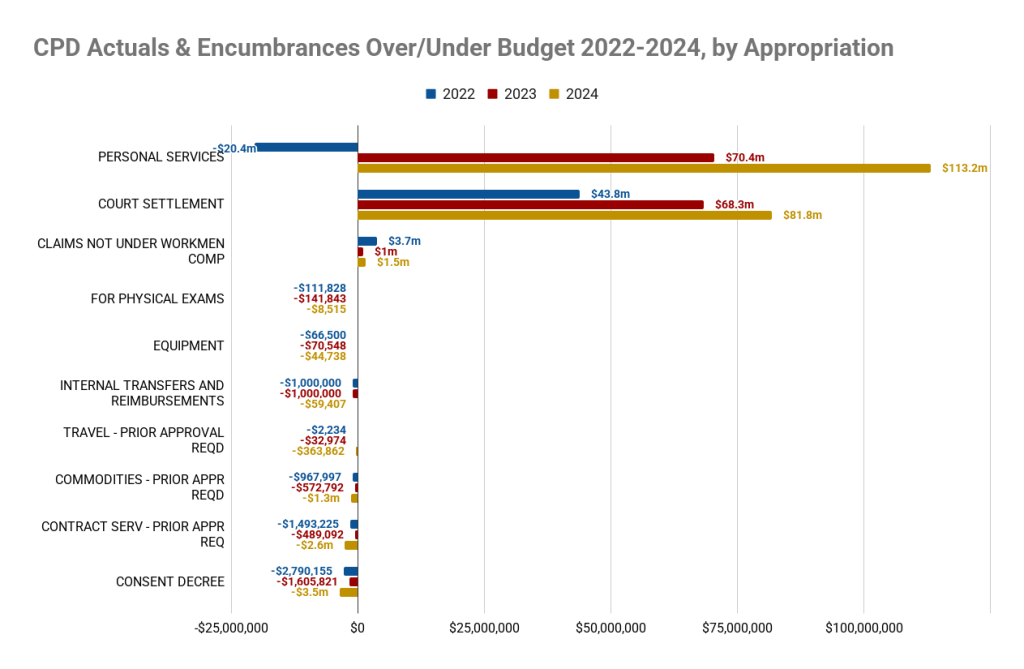
As a BGA Policy analysis noted in 2022, the city’s annual budget for police settlements and judgments has not changed since then-mayor Lori Lightfoot increased the budgeted amount to roughly $82.6 million for FY2020. That year, which saw significant court delays due to COVID-19 shutdowns, was the only one in recent history in which CPD underspent its settlements and judgments budget.
Similar to CPD, CFD’s 2024 overspend was in the personnel services, settlements and claims categories.
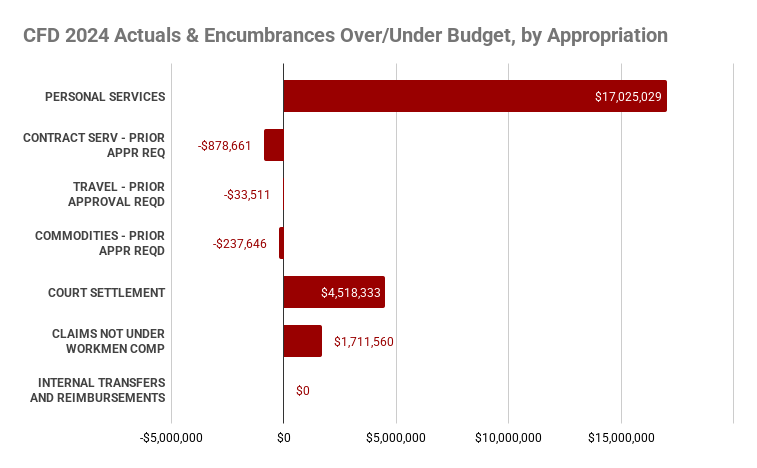
All of CCHR’s roughly $16,000 of overspend came in the personnel services category.
BGA Policy will include actuals and encumbrances data in its 2026 Budget Snapshots, a forthcoming series of department-level summaries designed to add context and highlight key budgetary concerns during the annual budget hearings.
To receive the BGA Budget Snapshots, sign up in advance for our dedicated Snapshots mailing list.
Related


